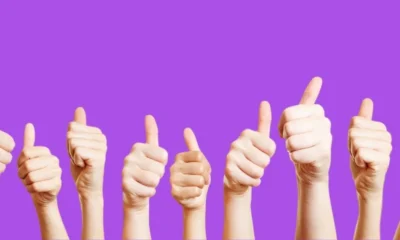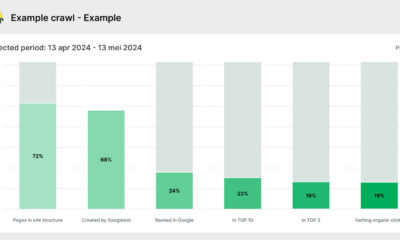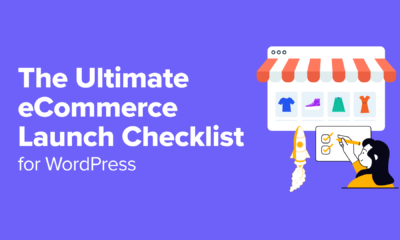MARKETING
Interview Preparation Checklist: 18 Tips to Get the Job

You’ve submitted your resume, talked to a recruiter, and set up a date for the first interview with a great company. But in the days leading up to the big interview, you’re feeling anxious, jittery, and downright scared.
What if you blank on how to answer a question? What should you say about your weaknesses? How soon do you follow up afterward?
If you’re feeling nervous about an upcoming interview, take a deep breath, grab a notepad, and work your way through this interview preparation checklist. You’ll be feeling a little less worried and a lot more confident in no time.
Pre-Interview Preparation Checklist
The steps you take leading up to the interview can really transform a normally stressful experience into something more pleasant. Sure, you could “wing it,” and answer questions on the fly as they come. But nothing will impress an interviewer more than showing that you did your homework. In your interview question prep, it’s smart to analyze your own working habits and study the company.
1. Print multiple copies of your resume.
Some interviews may require you to meet with multiple members of management, plus you may want to have one handy to reference as you talk about prior experiences. Print at least five copies of your resume on nice, high-quality paper, if possible.
2. Prepare a portfolio of your past work.
If the position requires you to show past work, like photographs, successful marketing campaigns, graphic designs, or written articles, gather your best work into one portfolio to share with the hiring team.
3. Review common interview questions.
Create a list of common questions, so you can begin preparing strong answers. Having some general talking points to the most-asked interview questions can help you feel less anxious for the interview process.
Even if the interviewer doesn’t ask one of the exact questions you’ve prepared for, they will likely ask something similar. For example, the interviewer might not ask “Why should we hire you?” but instead may say, “Tell us what makes you stand out from our other candidates.”
Here are some of the most common questions that come up in interview settings:
- Why do you want to work for us?
- What are your greatest strengths and weaknesses?
- Why should we hire you?
- Tell me about a time that you solved a problem at work.
- Why are you leaving your current position?
- Where do you see yourself in five years?
- What’s your biggest accomplishment?
- What’s something your current supervisor would say you could improve on?
- What is your leadership style?
- What would you plan to accomplish in your first 3 months here?
4. Practice answering interview questions out loud.
Now that you’ve come up with a list of commonly asked interview questions, you can start outlining responses. Jot down some notes for every question you come up with, and once you have it all down on paper, start practicing your answers out loud. Sit in front of a mirror and recite responses. Your goal is to make them clear, concise and to the point, so you aren’t rambling in the actual interview.
5. Try having a mock interview for extra practice.
Practicing an interview with a housemate or friend is another effective way to practice your interviewing skills. The mock interviewer can help give you notes on improving your answers or digging more in-depth for certain questions.
6. Spend time researching the company.
It can be embarrassing to enter an interview, only to not know the basics like what the company does or who the CEO is. You should, at bare minimum, be prepared with the company’s products or services, ownership, customer demographics, and main competitors.
It’s also smart to look up any recent press releases about the company to be in the know on its latest developments, and check in on their social media to get an idea of the tone, voice, and key initiatives of the company.
7. Create a list of your accomplishments.
The main point of the interview is to show off your skills and talents in order to score a new job. But when you’re nervous, it’s easy to forget some of the impressive projects you’ve completed or problems you’ve solved during your career. Take notes on some of your biggest career highlights to share with the interviewer.
8. Prepare questions to ask your interviewer.
Asking thoughtful questions to the interviewer shows that you’ve done your homework and you’re interested in the company. Plus, the interview is a two-way street. Just as the company wants to make sure you are the right fit for the job, you should do your due diligence to make sure the company and position are a good fit for you.
Here are some questions to ask about the position, the interviewer, the culture, and the company as a whole:
- What does a typical day in this position look like?
- What are the biggest challenges in this role?
- What do the training and evaluation processes look like for this role?
- Why is the person previously in this position leaving?
- What do you hope to see the person who takes this position accomplish in the first three months, six months, and first year?
- Why did you come to this company, and what is your favorite part of working here?
- What are some of the company’s short- and long-term goals, and how would the person in this role help in reaching those targets?
- Can you tell me more about the team I’d be working with? What are the strengths and weaknesses of the team or department?
- How would you describe the work environment here?
- What are the next steps in the hiring process?
Interview Preparation Checklist
It’s the day of the interview. You have your portfolio and resume copies next to your car keys or bus pass, you’ve recited questions and answers in your head for days, and you’re just hours from walking through the front door of the company building. Here’s what to do before and during the interview.
1. Dress the part.
In general, you should wear clothing that fits well and makes you feel good. Mend holes, treat stains, and lint-roll any pet hair on your favorite interview outfit.
What you wear to the interview may vary based on the job and company, but here are some guidelines for what to wear depending on the company’s dress code.
- Casual: Dark jeans, slacks, long skirts, or long dresses; button-down shirts, blouses, cardigans, or sweaters; tops without graphics; neat, closed-toe shoes.
- Business Casual: Dark slacks or long skirts; button-down tops, blazers; neat, closed-toe shoes.
- Formal: Dark suits with slacks or long skirts; dark, tailored dresses; a tie with suits; neat, closed-toe shoes.
2. Arrive on time (or early).
Showing up to an interview can leave a bad first impression. Plan to arrive 10 to 20 minutes early, and give yourself time to find the building, park, and check-in with the front desk. Account for traffic, too — that 9 a.m. interview means that you’ll be driving along during morning rush hour. Have a backup transportation option, such as biking, walking, or getting a ride from a friend, if you typically take public transit, in case the train or bus is running late that day.
If the building is in a location you’ve never been to, make sure you map it out to avoid getting lost. If you’re not great with directions, you may want to practice the drive once or twice in the days leading up to the interview.
3. Bring paper and something to write with.
Taking notes shows that you are invested in what the interviewer is saying to you. But it also means you can review your notes for pros and cons if you are offered the job. Plus, you can revert back to any points the interviewer made early on in your appointment and ask for more information or clarification when it’s your turn to ask questions.
4. Have cash on hand for parking.
Some companies have paid parking garages or valet services for guests. While they might validate the parking ticket for you, don’t assume they will. Bring about $20 in cash just in case you need it for parking. If you don’t need the cash, take yourself out to lunch as a post-interview treat!
5. Be personable and courteous.
Everyone you meet from the parking garage to the interviewer could be your future co-workers. They may also be asked for input on how you interacted with them during the hiring process. Smile, wave hello, and greet anyone you pass. It never hurts to be kind to others!
6. Remain honest and take breaks as needed.
If you fabricate your resume or interview responses, the truth will become clear while you’re on the job. Answer questions honestly, and if you aren’t sure how to respond to a question off the bat, don’t be afraid to take a moment. Simply say, “Great question! Let me think for just one second on this.” We’re all human, and it’s a completely normal response to need to pause before thoughtfully answering a question.
7. Use the STAR method.
The STAR method is a popular technique for responding to even the toughest interview questions. Interviews ask situational questions to gauge how you respond to certain issues. The STAR method addresses multiple components of a problem while allowing you to clearly, thoroughly explain your logic and response.
- Situational: Describe the situation or issue.
- Task: Explain what your tasks or responsibilities were relating to the situation.
- Action: Share what actions you took to complete your tasks and address the situation.
- Results: Outline how your actions resolved the issue or what results came from your actions.
8. Stay focused and positive.
Interviewing is stressful and nerve-wracking, but remaining positive and upbeat can make all the difference in your performance. You might be asked why you are leaving your position or how you performed under previous managers and their varied leadership styles. Talking poorly about the company and previous leaders can leave a bad impression on your interviewer.
Keep your answers positive, and stay focused on answering each question with your experience rather than rambling as you respond. This is where practicing answers in the pre-interview preparation can come in handy.
Post-Interview Preparation Checklist
Just because you’ve shaken the hands of your interviewer(s) and taken a big sigh of relief, it doesn’t mean the interview is behind you. Of course, you could be brought in for second, third, or fourth interviews, but no matter what stage you’re at, it’s important to leave a good, lasting impression.
1. Ask about the next steps.
Either at the end of your interview or immediately after, you’ll want to ask about the timeline for the next steps of the hiring process. This way, you can anticipate when you’ll hear back from the company. You may need to take an edit test, share more samples of your work, or return for another interview.
2. Follow up with a thank you.
Always follow up an interview with a thank-you note. It’s best to send along a handwritten note to show your care and attention to detail. But if you don’t have the time to do so, an email is also a thoughtful way to show your appreciation for the interviewer’s time and consideration. If you don’t know the interviewer’s email, you can also email the recruiter or other point of contact and ask them to send along your gratitude.
Get Your Dream Job with Some Interview Prep
The interview question prep process can make or break your interview experience. While sending along your resume and portfolio in advance can give recruiters a good idea of whether or not you’d be great at the job, the interview helps the team learn more about you and how you work.
Don’t forget, interviewing is a two-way street, and the more you prepare, the better questions you can ask. By following this interview preparation checklist, you’ll feel more confident and prepared as you navigate your next interview.













![How to Create A Website to Sell Products In 8 Steps [+6 Expert Tips] How to Create A Website to Sell Products In 8 Steps [+6 Expert Tips]](https://articles.entireweb.com/wp-content/uploads/2024/10/1727868370_How-to-Create-A-Website-to-Sell-Products-In-8.webp-400x240.webp)
![How to Create A Website to Sell Products In 8 Steps [+6 Expert Tips] How to Create A Website to Sell Products In 8 Steps [+6 Expert Tips]](https://articles.entireweb.com/wp-content/uploads/2024/10/1727868370_How-to-Create-A-Website-to-Sell-Products-In-8.webp-80x80.webp)






You must be logged in to post a comment Login